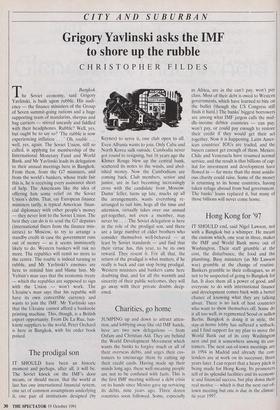CITY AND SUBURBAN
Grigory Yavlinski asks the IMF to shore up the rubble
CHRISTOPHER FILDES
he Soviet economy, said Grigory Yavlinski, is built upon rubble. His audi- ence — the finance ministers of the Group of Seven summit-going nations and a huge supporting team of mandarins, sherpas and bag carriers — stirred uneasily and fiddled with their headphones. Rubble? Well, yes, but ought he to say so? 'The rubble is now experiencing inflation ... ' Oh, rouble . . . well, yes, again. The Soviet Union, still so called, is applying for membership of the International Monetary Fund and World Bank, and Mr Yavlinski leads its delegation to their annual meetings here in Bangkok. From them, from the G7 ministers, and from the world's bankers, whose trade fair this is, he is receiving every assistance short of help. The Americans like the idea of offering him some relief on the Soviet Union's debts. That, say European finance ministers tartly, is typical American finan- cial diplomacy with other people's money — they never lent to the Soviet Union. The best they can do is to send the G7 deputies (international fixers from the finance ministries) to Moscow, to try to arrange a
standby credit in case the government runs out of money — as it seems imminently likely to do. Western bankers will risk no more. The republics will remit no more to the centre. The rouble is indeed turning to rubble, and Mr Yavlinski's enemies are here to remind him and blame him. Mr Yeltsin's man says that the economic treaty — which the republics are supposed to sign with the Union — won't work. The Ukraine's man says that his republic will have its own convertible currency and wants to join the IMF. Mr Yavlinski says that the Ukraine cannot afford a banknote printing machine. This, though, is a British export opportunity. From De La Rue, ban- knote suppliers to the world, Peter Orchard is here in Bangkok, with his order book poised.


























































 Previous page
Previous page